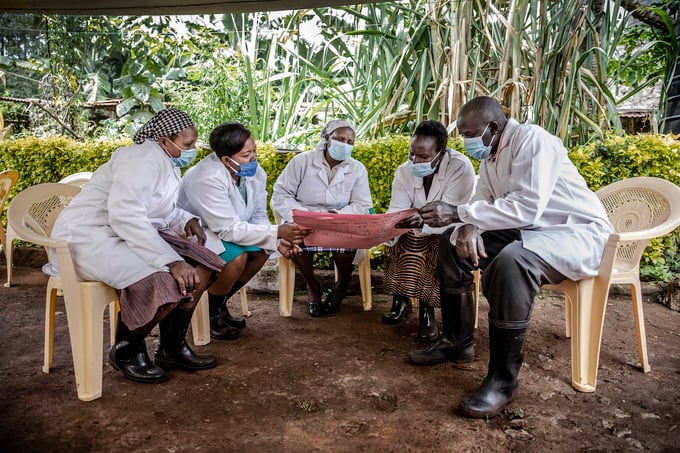November 28, 2025 | 04:17 GMT +7
November 28, 2025 | 04:17 GMT +7
Hotline: 0913.378.918
November 28, 2025 | 04:17 GMT +7
Hotline: 0913.378.918

Chicken farmers in Kenya shares notes about AMR risks.
The Antimicrobial Resistance Multi-Stakeholder Partnership Platform was launched today to ensure the growing threats and impacts of antimicrobial resistance are addressed globally.
The Food and Agriculture Organization of the United Nations (FAO), the UN Environment Programme (UNEP), the World Health Organization (WHO) and the World Organisation for Animal Health (WOAH), known as the Quadripartite, are joining forces on this initiative to underscore the threat AMR presents to humans, animals, plants, ecosystems and livelihoods.
An estimated 1.3 million people around the world die each year directly due to bacterial antimicrobial resistance (AMR). If no action is taken, that number could soar dramatically, bringing higher public health costs and pushing more people into poverty, especially in low-income countries, underscoring the need for the Platform to mobilise further coordinated efforts.
Antibiotics and other antimicrobials play a key role in the success of modern medicine and have greatly improved the health of humans and animals. But overuse and misuse have reduced their efficacy, with more pathogens developing the ability to survive the antimicrobials designed to eliminate them.
AMR occurs when bacteria, viruses, fungi and parasites no longer respond to antimicrobial agents. As a result of drug resistance, antibiotics and other antimicrobial agents become ineffective and infections become difficult or impossible to treat, increasing the risk of disease spread, severe illness and death.
Moreover, 1.3 billion people rely on livestock for their livelihoods and 20 million people depend on aquaculture, especially in low and middle-income countries. The spread of resistant strains of pathogens inexorably affects their livelihoods, as it increases animal suffering and losses. Applications to crops, as well as unproper disposal of unused and expired drugs and waste from industries and communities can lead to pollution of soils and streams that spread the trigger for unwanted microorganisms to develop resistance to tools meant to contain and eliminate them.
The new Antimicrobial Resistance Multi-Stakeholder Partnership Platform is an inclusive and international forum bringing together voices from all areas, sectors and perspectives through a holistic and system-wide One Health approach, for a shared vision responding to the need to improve coordination of efforts by a large number of stakeholders.
Quotes by the Quadripartite leaders
“Antimicrobial resistance threatens animal health, food safety and food security, economic prosperity and ecosystems worldwide,” said FAO Director-General QU Dongyu. “The world needs to join forces now to prevent drug-resistant diseases and reduce its implications.”
“AMR challenges cannot be understood or addressed separately from the triple planetary crisis – the crisis of climate change, the crisis of nature and biodiversity loss, and the crisis of pollution and waste, all of which are driven by unsustainable consumption and production patterns,” said UNEP Executive Director Inger Andersen. “The climate crisis and AMR are two of the greatest and most complex threats the world currently faces. Both have been worsened by and can be improved with human action.
“This platform will be vital in raising the profile and urgency of addressing AMR while building and maintaining political momentum and public support,” said WHO Director-General Dr Tedros Adhanom Ghebreyesus. “It will help to drive global coordination so that our collective response is more strategic, resource efficient and sustainable.”
“We can get ahead of AMR with the right partnerships and collaborative models. The time to act is now,” said WOAH Director General Monique Eloit. “We are striving to protect everyone from the threat of AMR.”
World Antimicrobial Awareness Week and the Platform
As drug-resistant infections can affect anyone, anywhere, public health, agrifood systems and ecosystems everywhere are at risk. Tackling AMR is a shared responsibility for all of us, which is why the theme of this year’s World Antimicrobial Awareness Week, starting today, is “Preventing Antimicrobial Resistance Together”.
The Platform is a way to redouble collective efforts to save millions of lives and preserve the efficacy of antimicrobials for current and future generations by using them sustainably.
The new Platform will engage and empower stakeholders across the One Health spectrum in an inclusive, transparent way to build consensus among public and private stakholders on the global AMR vision, gain knowledge to foster a collective understanding of AMR challenges and opportunities, and take multi-stakeholder actions to contain, combat and reverse AMR in line with the Global Action Plan and National Action Plans.
(FAO.org)

(VAN) A new study reveals how the simultaneous effects of ocean acidification, salinity and loss of oxygen are making the world more fragile.

(VAN) Hopes are growing that the creation of the first 3D turkey gut model could be a turning point in the battle against the virulent blackhead disease.

(VAN) Tyson, America’s biggest meat supplier, plans to shutter one of its largest beef processing plants as the industry continues to struggle with low cattle supplies and political pressure from Washington.

(VAN) New FAO study shows how digital solutions are empowering farmers and fishers to prevent losses and build resilient agrifood systems.

(VAN) Brazil's COP30 presidency pushed through a compromise climate deal on Saturday that would boost finance for poor nations coping with global warming but that omitted any mention of the fossil fuels driving it.

(VAN) Poultry farmers in the UK have been warned that they could face one of the worst winters yet for bird flu.

(VAN) Prices of main-crop paddy have risen sharply, with jasmine rice hitting 16,100 baht per tonne — the highest level in years.